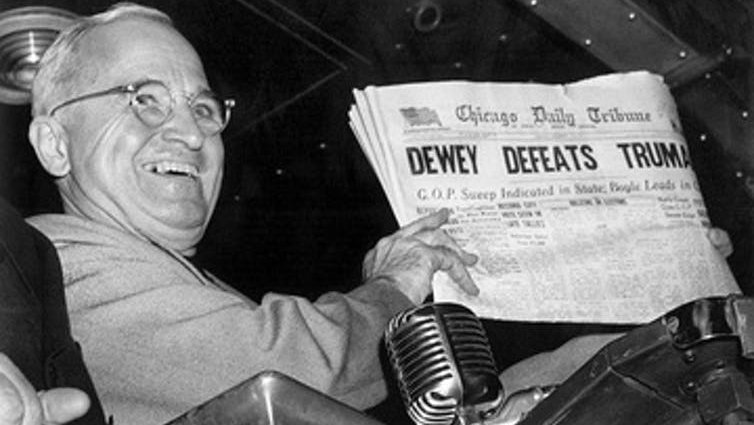Records of the betting on US presidential elections can be traced back to 1868. Since then, no clear favourite for the White House had lost before 2016, except in 1948, when the 8 to 1 longshot and sitting president, Harry S. Truman, famously defeated his Republican rival, Thomas E. Dewey.
In 2016, the exception was repeated when Hillary Clinton, trading at 7 to 2 on (equivalent to a win probability of about 78%) as polls opened, lost in the electoral college to Donald Trump. In so doing, Trump defied not just the polls and the experts but the “wisdom of the crowd” as displayed in the betting markets.
Trump achieved this by converting a near 3 million vote loss in the popular vote into a victory by 77 votes in the electoral college. In a larger sense, it might be said that crowd wisdom was trumped by the arcane US electoral system.
Associated Press photo by Byron Rollins
There was a similar consensus in the run up to the 2020 election that Trump would lose – but the degree of confidence displayed by the markets and the models diverged markedly. To illustrate, Sporting Index, the spread betting company, announced it thought Joe Biden would win with between 305 and 311 electoral votes as the polls opened on election day, with Trump trailing on 227 to 233 electoral votes.
Taking the mid-points of these spreads, this equated to a Biden triumph by 308 votes to 230 in the electoral college – a majority of 78. Similar estimates were contained or implicit in the odds offered by other bookmakers, betting exchanges and prediction markets.
Meanwhile, other major forecasting models were much more bullish about Biden’s prospects. Based on 40,000 simulations, the midpoint estimate of the model provided by Nate Silver and FiveThirtyEight put Biden ahead by 348 electoral college votes to 190 for Trump, a margin of 158. The New Statesman model made it 339 votes to 199 in favour of Biden. The Economist’s model was even more lopsided in favour of Biden, estimating that he would prevail by 356 electoral votes to 182. Taking the unweighted mean of all three forecasting models, Biden was projected to win 348 votes in the electoral college to 190 for Trump.
The other go-to place for expert opinion with a long track record of solid performance (except in 2016) is Sabato’s Crystal Ball based at the University of Virginia’s Center for Politics. This year it was projecting Biden to win the electoral college by 321 votes to 217. The PollyVote project, widely published in academic journals, goes a step further, combining information contained in betting markets with forecasting models, experts and beyond. This year it forecast a Biden victory by 329 electoral votes to 209.
Last bets please
Ten days on from the close of voting and it seems on current trends that Biden will end up with 306 votes in the electoral college to 232 for Trump. This assumes that Georgia, which has yet to be called by the networks, will go as most independent observers expect: for Biden.
If this does happen, the betting spreads will be almost spot on. In fact, both these numbers are within the spreads offered on election day. If Georgia ends up after a recount in the Trump column the betting markets will still have performed well – certainly compared to the forecasting models.
Read more:
Biden or Trump? Betting markets are more cautious than polls in predicting the 2020 US election
What this tells us is that the betting and prediction markets, which respond to the weight of money traded on each candidate, and are informed by considerable professional insight, have this year recovered a reputation dating back to at least 1868, and in the case of the Papal betting markets as far back as 1503.
So what are they telling us now? In a press release issued by Sporting Index on November 12, the firm’s political traders forecast the date on which they expect Trump to leave the White House as February 26, 2021. How can this be so, given that the presidential inauguration date for the next term of office is January 20, 2021? At that point, the loser of the election ceases to be in office.
Could it be that Biden is inaugurated but Trump barricades himself inside the Oval Office for five weeks? More realistically, the traders are factoring in the small possibility of Trump clinging on for a second term.
The Betfair markets offer an insight into this. The current president still has a 7.8% chance, according to the exchange trading, of retaining office at the end of all legal challenges. This, and presumably all other avenues to seize or retain power, are factored into this probability. In conclusion, is it likely, based on the current evidence in the betting markets, that Trump will prevail over all established custom and evidence? Not at all. Is it possible? Yes.
![]()
Leighton Vaughan Williams does not work for, consult, own shares in or receive funding from any company or organisation that would benefit from this article, and has disclosed no relevant affiliations beyond their academic appointment.










